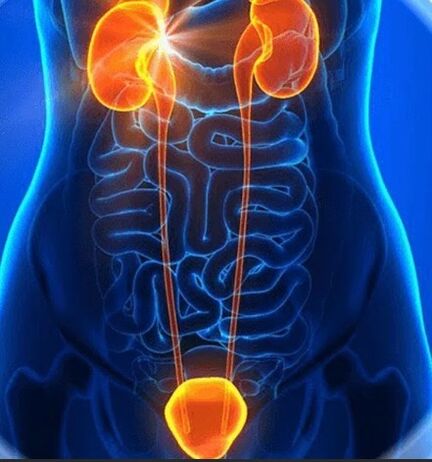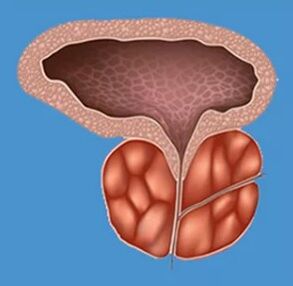Most of us are used to the fact that we need to carefully monitor our hearts, worry about lung health.But few men remember that they need special care for the "second heart" - the prostate gland.
This is a small organ with a nut size.Not every man knows where he is and for what is intended.But it is often one of the most important reasons for the health problems of the male half of humanity.Moreover, the problem can outstrip both a teenager and an adult aksacal.
Like any other disease, prostate inflammation -the most common disease of the prostate gland -is easier to prevent than to cure and more easily to treat in the early stages.Therefore, it is extremely important for every person to know the symptoms of this disease so that he or she can contact a urologist on time.

The prostate gland or prostate is a muscle organ that is an integral part of a person's sexual system.It is located in the pelvis, under the bladder, weighs only about 20-30 grams.The main function of the prostate, if we speak a simplified language, is to produce a fluid that is part of the sperm.
Despite its modest size (the size of a small chestnut), this small piece of iron can beat any herculas.
According to the World Health Organization, every third person among the residents of Europe and the US has at least once noticed symptoms of inflammation of the prostate gland.Every fifth person has chronic prostatitis.
Prostate adenoma, which has prostatitis-like signs, is detected in 10-15% of men older than 50 years.The numbers of the increasing number of prostate diseases in young men, especially chronic forms, as well as forms leading to infertility, are particularly disturbed.
It is easy to acquire prostate inflammation, but has been treated for many years.
Urologists and andrologists - doctors who treat prostatitis - often call this disease a "silent disease" because it may not announce its existence at first.When this disease is noticed as a rule, we are already talking about complications from prostate inflammation.
Each patient differs from his or her own, special course of the disease and the causes of its occurrence.
The causes of prostatitis
Prostatitis is an inflammation of the prostate gland.The main cause of the disease is stagnation in the pelvis.It can provoke it for disorders of the gastrointestinal tract, which occur in the form of frequent constipation and intestinal disorders.Among other reasons:
- disorders of the immune system;
- sexually transmitted, other infectious diseases;
- circulation in the penis;
- irregular sex life;
- Neuroendocrine disorders in the body.
Symptoms of prostatitis
The characteristic symptoms of prostate inflammation are disorders of the urinary system.The reason is that with inflammation the prostate increases in size and begins to squeeze the urethra.In the absence of treatment, the inflammatory process causes sclerosis of the bladder neck and in the case of more severe development of the disease, the ureter can be completely blocked.
The second important feature is the disorder of sexual function.This is manifested in the form of a weakening of erection, the poor weight of the orgasm.As a result, impotence and infertility develop.
Other characteristic signs of prostatitis:
- sensation of burning in the crotch and urethra (urethra);
- unpleasant sensations in the prostate and urine during bowel movements (defecation);
- increased and increased urination intensity;
- difficulty and periodicity of urination;
- Disposal from the urethra pH on the walls of the intestine;
- Floating "threads" are noticeable in the urine;
- Long unexplained erections are noted at night;
- acceleration of ejaculation during intercourse;
- Deleted orgasm;
- increase in overall fatigue;
- depressive, anxious state, mental depression in anticipation of complications;
- Erection deterioration.

Not all of the symptoms listed are noted immediately.Therefore, do not wait for the whole "bouquet" - as soon as you noticed one or two of the symptoms described above - go to a specialist immediately.Do not consult friends, do not cultivate yourself as everyone has their own symptoms and their own course of illness.
Other signs may appear over time.Appears:
- Pain of sick character at the base of the root of the penis;
- pain in the scrotum;
- Perineum pain.
Doctors include infertility, which produces sperm but lose their mobility among the short symptoms.
Strengthening pain in patients may indicate that the stones have formed in the prostate gland.Getting rid of them is much more difficult than kidney stones or even gallbladder.When discovered, the doctor can only delay his education with the help of medicines in the future and increase existing ones.
Often the urologist is already addressed at these stages when prostatitis also affects the work of other organs and systems.In this case, other specialists should participate in the treatment.
Who risks getting prostatitis?
Risk groups include men who:

- Lead a sedentary lifestyle;
- representatives of professions where you have to sit for 8 or more hours in a row;
- which have chronic constipation;
- transferred infectious diseases of the genological system;
- They have no regular sex life;
- Lead a random sex life;
- suffering from alcoholism.
Diagnosis of inflammation of the prostate gland
In order to determine exactly the stage of the disease and to prescribe the appropriate treatment, diagnostics will be performed, including:
- Clinical examination;
- blood tests;
- urine analysis;
- Analysis of prostate secretion;
- Ultrasound;
- Urooflowetry.
What medicines are being treated?
At the end of the diagnostic study, doctors usually prescribe complex treatment, including:
- treatment of the immune system;
- The treatment of infections, if any, is usually detected - with the help of antibiotics;
- Antibacterial drugs designed to treat accurate prostate diseases.

Different physiotherapy procedures such as:
- massage;
- Magnetosinonance therapy;
- laser treatment;
- reflexology;
- ultrasound;
- Hirudotherapy.
Prevention and diagnosis of prostatitis
Every man under the age of 40 is simply obliged for maintaining his male health annually to undergo a urologist.After 40, this should be done once every six months.
Over time, not cured or advanced inflammation of the prostate gland cannot lead to a number of complications listed above, which can seriously complicate your life, not just sexual.
The main preventative measure is, of course, the banal leading of a healthy lifestyle.And since blood stagnation in the pelvic organs is one of the most common causes of the disease, it is necessary to compensate for the sedentary and inactive work with the help of exercise and outdoor activities with all forces.
It is important to avoid hypothermia as well as to have a regular sex life.






























